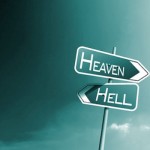By Fr. George Metallinos
 This is part one of a four part series on Paradise and Hell by the Dean of the Athens University School of Theology.
This is part one of a four part series on Paradise and Hell by the Dean of the Athens University School of Theology.
On Meatfare Sunday, as we prepare for the commencement of the Holy and Great Lent, we commemorate the Second and Incorruptible Coming of our Lord Jesus Christ. The expression “we commemorate” confirms that our Church, as the Body of Christ, reenacts in its worship the Second Coming of our Lord as an event and not just something that is historically expected. The reason is that through the Divine Eucharist, we are transported to the celestial kingdom, to meta-history. It is in this Orthodox perspective that the subject of Paradise and hell is approached.
In the Gospels (Matthew, Ch. 5), mention is made of kingdom and eternal fire. In this excerpt, the kingdom is the divine destination of mankind. The fire is”prepared” for the devil and his “angels” (demons), not because God desired it, but because they are impenitent. The kingdom is prepared for those who remain faithful to the will of God. Kingdom (the uncreated glory) is Paradise. Fire (eternal) is hell (Mt 5:22).
At the beginning of history, God invites man into Paradise, into a communion with His uncreated Grace. At the end of history, man has to face Paradise and hell. What this means, we shall see, is further down. We do however stress that it is one of the central subjects of our faith – it is Orthodox Christianity’s philosophical cornerstone.
(I) Mention of Paradise and hell in the New Testament is frequent. In Luke 23:43, Christ says to the robber on the cross:
Verily I say unto thee, today shalt thou be with me in Paradise. (Lk 23:43).
However, the robber also refers to Paradise, when he says:
“Lord, remember me when thou comest into thy kingdom.” (Lk 23:42).
According to St. Theofylaktos of Bulgaria,
“for the robber was in Paradise, in other words, the kingdom.”
The Apostle Paul (2 Cor 12:3-4) confesses (of himself):
“And I knew such a man, (whether in the body, or out of the body, I cannot tell; God knoweth.) How that he was caught up into Paradise, and heard unspeakable words, which it is not lawful for a man to utter”
In Revelations we read:
“To him that overcometh will I give to eat of the tree of life, which is in the midst of the paradise of God” (Rev 27).
And Arethas of Caesaria interprets:
“Paradise is understood to be the blessed and eternal life.”
Thus, Paradise, eternal life, Kingdom of God, are all related.
(2) Paradise and hell are not two different places. This separation idea is an idolatrous concept. They instead signify two different situations (ways), which originate from the same uncreated source, and are perceived by man as two, different experiences. Or, more precisely, they are the same experience, except that they are perceived differently by man, depending on man’s internal state. This experience is the sight of Christ inside the uncreated light of His divinity, of His glory. From the moment of His Second Coming, through eternity, all people will be seeing Christ in His uncreated light. That is
“… the hour is coming, … all that are in the graves shall hear his voice, and shall come forth; they that have done good, unto the resurrection of life; and they that have done evil, unto the resurrection of damnation.” On 5:28-29).
In the presence of Christ, mankind will be separated (sheep and goats, to His right and His left). In other words, they will be discerned in two separate groups: those who will be looking upon Christ as Paradise and those who will be looking upon Christ as hell.
“For our God is a consuming fire.” (Heb 12:29).
